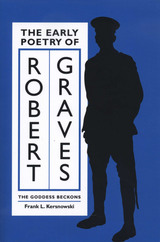
Like many men of his generation, poet Robert Graves was indelibly marked by his experience of trench warfare in World War I. The horrific battles in which he fought and his guilt over surviving when so many perished left Graves shell-shocked and disoriented, desperately seeking a way to bridge the rupture between his conventional upbringing and the uncertainties of postwar British society.
In this study of Graves's early poetry, Frank Kersnowski explores how his war neurosis opened a door into the unconscious for Graves and led him to reject the essential components of the Western idea of reality—reason and predictability. In particular, Kersnowski traces the emergence in Graves's early poems of a figure he later called "The White Goddess," a being at once terrifying and glorious, who sustains life and inspires poetry. Drawing on interviews with Graves's family, as well as unpublished correspondence and drafts of poems, Kersnowski argues that Graves actually experienced the White Goddess as a real being and that his life as a poet was driven by the purpose of celebrating and explaining this deity and her matriarchy.

Originally published in German as Die Gesellschaft der Uberlebenden, The War in Their Minds examines hitherto unused source material—psychiatric medical files of soldiers—to make clear how difficult it was for the soldiers and their families to readjust to normal, everyday life. Goltermann allows these testimonies of violence, guilt, justification, and helplessness speak for themselves and sensitively explores how the pension claims of returning soldiers were to compete with the claims of the Holocaust victims to compensation.

A War of Nerves is a history of military psychiatry in the twentieth century—an authoritative, accessible account drawing on a vast range of diaries, interviews, medical papers, and official records, from doctors as well as ordinary soldiers. It reaches back to the moment when the technologies of modern warfare and the disciplines of psychological medicine first confronted each other on the Western Front, and traces their uneasy relationship through the eras of shell-shock, combat fatigue, and post-traumatic stress disorder.
At once absorbing historical narrative and intellectual detective story, A War of Nerves weaves together the literary, medical, and military lore to give us a fascinating history of war neuroses and their treatment, from the World Wars through Vietnam and up to the Gulf War. Ben Shephard answers recurring questions about the effects of war. Why do some men crack and others not? Are the limits of resistance determined by character, heredity, upbringing, ideology, or simple biochemistry?
Military psychiatry has long been shrouded in misconception, and haunted by the competing demands of battle and of recovery. Now, for the first time, we have a definitive history of this vital art and science, which illuminates the bumpy efforts to understand the ravages of war on the human mind, and points towards the true lessons to be learned from treating the aftermath of war.
READERS
Browse our collection.
PUBLISHERS
See BiblioVault's publisher services.
STUDENT SERVICES
Files for college accessibility offices.
UChicago Accessibility Resources
home | accessibility | search | about | contact us
BiblioVault ® 2001 - 2024
The University of Chicago Press









